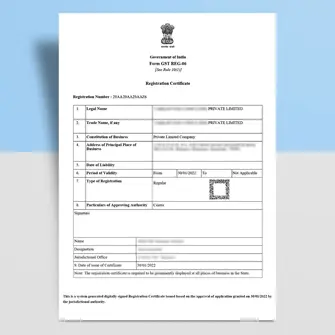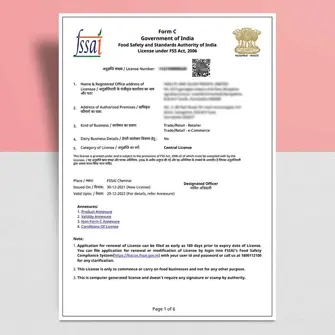- Startup
Start Your Business
Exit Your Business
- Compliances
Change Services
Mandatory Compliances
Change in Structure
- Services
- ISO
- FSSAI
- ITR
- Contact Us

Documents Required
Private Limited Company
Company registration including Government Fee & Stamp Duty. Incorporation kit with share certificates.
Pricing Summary
Market Price: ₹14999
Finnext: ₹11,800 All Inclusive
₹10,000 + ₹1800 GST
You Save: ₹3199
Government Fee: Excluded
Company Registration in India
In India, company registration can be completed online through Finnext. A private limited company is the most common type of legal entity that is preferred by millions of Indian Entrepreneurs and popular startups like Flipkart, PhonePe and Swiggy. A private limited company can be registered online in less than 10 days at a very affordable price of just Rs. 9999.
A Private Limited Company (PLC) is one of the most common types of legal entity in India. Private Limited Companies are governed by the Companies Act, 2013 and require a minimum of 2 Directors and 2 Shareholders with one of the Directors being an Indian Resident and Indian Citizen.
To register a company in India, the following are minimum requirements:
The proposed directors of a private limited company must present the following documents as proof of identification in order to register a company:
Indian Nationals: PAN card mandatory
Foreign Nationals: Passport is mandatory
In addition to the above document, the Directors must submit one of the following documents that contain the address of the Director.
Indian Nationals: Passport / Driver’s License / Election ID / Ration Card / Aadhar ID
Foreign Nationals: Drivers License / Bank Statement / Residence Card
Finally, as proof of residency, the prospective Directors must produce one of the following documents. This document must have been generated within the last two months:
Indian Nationals: Bank Statement / Electricity Bill / Phone Bill
Foreign Nationals: Bank Statement / Electricity Bill / Phone Bill
If one of the company’s shareholders is a company based in India or abroad, the following documents must be submitted:
A company can be started in India with a very minimum amount of capital. There is no fixed amount and the shareholders of the company being incorporated can determine the capital they wish to contribute. While setting up the capital structure of the company, the following are some of the concepts to be kept in mind:
Face Value of Share: The face value of a share is the price per share with which the company is incorporated. Normally, the face value of a share is Rs. 1 or Rs. 10 or Rs. 100 or Rs. 1000 or Rs. 10,000.
Authorised Capital: Authorised capital is the total value of shares a company can issue to shareholders. Normally, all companies are incorporated with an authorized capital of Rs. 1 lakh or Rs. 10 lakhs. If a higher authorized capital is required, the company would be required to pay additional fees to the Ministry of Corporate Affairs. The authorised capital of a company can be increased at any time after incorporation.
Paid-up Capital: Paid-up capital of a company is the number of shares issued to shareholders for which they have paid or deposited money to the company. Paid-up capital of a company cannot be more than the authorized share capital of the company.
The following are the steps involved in registering a company in India:
An application for company name approval is first submitted to the Ministry of Corporate Affairs to reserve the company name. In the name approval application, 1 or 2 names with business objectives can be submitted. If a name approval is rejected, 1 or 2 more names can be resubmitted. Normally, the MCA approves all name approval applications in less than 5 working days.
In India, the Ministry of Corporate Affairs does not allow wet signatures. All signatures for filings with the MCA must be completed with a digital signature that is issued by a Certification Authority in India. Hence, digital signatures are mandatorily required for the Directors before incorporation.
Digital signatures for the Directors will be obtained through an Authorized Certifying Authority by IndiaFilings. To obtain a Digital Signature, the Directors will have to submit a copy of their identity proof and complete a video KYC process. If the Director is a foreign national, the passport and other documents submitted must be apostilled by a local embassy.
Once the digital signatures are obtained, the incorporation application can be filed in SPICe Form to the MCA with all relevant attachments. Along with the incorporation application, the Memorandum of Association (MOA) and Articles of Association (AOA) of the company are filed. If the MCA finds the incorporation application to be complete and acceptable, the Incorporation Certificate is granted along with the PAN of the company. The MCA normally accepts all incorporation applications in less than 5 working days.
Once a company is registered in India, various compliances must be maintained from time to time to avoid penalties and prosecution. The following are some of the compliances a company would be required to complete after company registration:
Auditor Appointment: All companies registered in India must appoint a practising and licensed Chartered Accountant registered with the ICAI within 30 days of incorporation.
Director DIN KYC: All persons who hold a Director Identification Number (DIN) – which is allocated during the incorporation process must complete DIN KYC each year to validate the phone and email address on record with the Ministry of Corporate Affairs.
Commencement of Business: Within 180 days of incorporation, the company must open a Bank Current Account and the shareholders must deposit the subscription amount mentioned in the MOA of the company. Hence, if the company was to be incorporated with a paid-up capital of Rs. 1 lakh, then the shareholders must deposit Rs. 1 lakh in the Company’s bank account and file the bank statement with the MCA to obtain a commencement of business certificate.
MCA Annual Filings: All companies registered in India must file a copy of the financial statements with the Ministry of Corporate Affairs each financial year. If a company is incorporated between January – March, the company can choose to file the first MCA annual return as a part of the next financial year’s annual filing. MCA annual return consists of Form MGT-7 and Form AOC-4. Both these forms must be digitally signed by the Directors and a practising professional.
Income Tax Filing: All companies must file an income tax return using Form ITR-6 each financial year. Income tax filing must be done for each financial year before the due date – irrespective of the incorporation date. The income tax return of a company must be digitally signed using one of the Director’s digital signature.
All companies registered in India are required to maintain a registered office in India. The registered office must have a board with the name of the company and should be a place where notice or communication if any can be served. Hence, the registered office of a company cannot be vacant land or under construction premises.
After incorporation, the registered office of a company can be changed if required. In case the registered office is changed within the same city or the same Registrar of Company, the process can be completed easily. In case the registered office of a company is changed from one state to another, the process would be longer and more cumbersome.
During the company registration process, the Directors can opt to obtain GST registration along with the incorporation. However, it is not mandatory for a company to be registered under the GST unless certain turnover limits are crossed. You can learn more about the turnover limit and process for obtaining GST registration in our detailed guide on GST registration in India.
After company registration, a bank current account must be opened in the name of the company within 180 days and the subscription amount must be deposited. If the above steps are not completed, the commencement of business certificate will not be issued and a penalty will be applicable.
The following are the documents required to open a bank account for a private limited company:
At IndiaFilings, we work with various banks to help our clients open current accounts for their companies in a seamless fashion.
The following are the major advantages of incorporating a private limited company in India versus other entity types.
A company is both a legal entity and a juristic person. Therefore, a company has broad legal rights to acquire property, incur debts, hire people, etc. As a company is a separate legal entity, the company’s members (shareholders or directors) are not personally liable for the company’s liability.
A private limited company is a separate legal entity with limited liability provisions. Therefore, the shareholders are not liable for the losses of the company – for an amount more than what was invested by them into the company as share capital.
A company has ‘perpetual succession,’ which means it will continue to exist until it is legally dissolved. Because a company is a separate legal entity, it is unaffected by the death or other departure of any of its members, and it continues to exist regardless of membership changes.
A private limited company has multiple options for fundraising. A company can raise funds from shareholders, investors, angels, venture capital funds, private equity funds, foreign funds, NBFCs, banks and other financial institutions. Only a company can raise debt and equity funds from investors.
While a company has various advantages, registering a company may not be ideal for all entrepreneurs due to the following reasons:
A company has to mandatorily maintain various compliances irrespective of business turnover or activity. Hence, operating a company involves a minimum recurring cost each year.
PAN is mandatory for Indian Directors.
Passport is mandatory for Foreign Directors or Shareholders.
Aadhaar is mandatory for Indian Directors.
Any document issued by a Foreign Government having photo and address of the Director or Shareholder.
Latest bank statement of the Directors and Shareholders.
Latest electricity bill for the registered office premises.
Latest telephone bill for the registered office premises. Electricity bill preferred.
Latest mobile bill for the registered office premises. Electricity bill preferred.
If the proposed shareholder is another company or legal entity.
If the proposed shareholder is another company or legal entity.
Passport size photo of the Directors and Individual Shareholders.
Business Place
| Features | Proprietorship | Partnership | LLP | Company |
|---|---|---|---|---|
| Definition | Unregistered type of business entity managed by one single person | A formal agreement between two or more parties to manage and operate a business | A Limited Liability Partnership is a hybrid combination having features similar to a partnership firm and liabilities similar to a company. | Registered type of entity with limited liability to the owners and shareholders |
| Ownership | Sole Ownership | Min 2 Partners Max 50 Partners | Designated Partners | Min 2 Directors Min 2 Shareholders Max 15 Directors Max 200 Shareholders |
| Registration Time | 7-9 working days | |||
| Promoter Liability | Unlimited Liability | Limited Liability | ||
| Documentation | MSME GST Registration | Partnership Deed | LLP Deed Incorporation Certificate | MOM AOA Incorporation Certificate |
| Governance | - | Under Partnership Act | LLP Act, 2008 | Under Companies Act,2013 |
| Transferability | Non Transferable | Transferable if registered under ROF | Transferable | |
| Compliance Requirements | Income tax filing if turnover is more than Rs.2.5 lakhs | IRT 5 | Form 11 Form 8 ITR 5 | ITR 6 MCA Filing Auditor'sappointment |
The cost of registering a company in India varies according to the number of stakeholders and size. The Cost of Incorporation of a private limited Company would vary from Rs.6, 000 – to Rs. 30,000/- depending upon the following:
Company registration is mandatory in India to start any business, so fixing the business structures is crucial. In India, there are seven different types of company registration:
In addition to registration or incorporation, a business may require other registrations depending on the business activity undertaken. Talk to an Advisor to find out registrations your business may require post-registration.












| Form | Company Compliance | Due date | Penalty |
|---|---|---|---|
| COB Filing | Commence of Business Certificate | To be filed before 180 days of company Incorporation | Rs.50,000 for non-compliance |
| DIR 3 EKYC | Any director with DIN | Before 30th September every year | Deactivation of the DIN A late filing fee of Rs.5,000 Disqualification of the Directors |
| Form ADT 1 | Appointment of auditor | Within 15 days from the date of appointment of the Auditor | Late fees will be applicable, with fees ranging from 2 to 12 times the nominal fee, depending on the number of days of delay. |
| Form AOC 4 | Filing financial statements of the company | 30 days from the conclusion of the AGM | Late fees will be applicable, with fees ranging from 2 to 12 times the nominal fee, depending on the number of days of delay. |
| Form MGT 7 | Annual Returns of the Company | 60 days from the conclusion of the AGM | |
| Form | LLP Compliance | Due date | Penalty |
|---|---|---|---|
| DIR 3 KYC | For every designated partners of a limited liability partnership (LLP) with DIN | Before 30th September every year | Deactivation of the DIN A late filing fee of Rs.5,000 Disqualification of the Partners |
| Form 11 | Annual Returns | May 30th every year | Late fees will be applicable, with fees ranging from 1 to 50 times the nominal fee, depending on the number of days of delay. |
| Form 8 | Statements of Accounts and Solvency | 30th October every year | Late fees will be applicable, with fees ranging from 1 to 50 times the nominal fee, depending on the number of days of delay. |
| Entity | Form | Due date |
|---|---|---|
| Annual Return (Form MGT-7) | 60 days from the conclusion of the AGM or 28th November 2023 (Which Ever is Earlier) | |
| Financial Statements (Form AOC-4) | 29th October 2023 | |
| DIR-3 KYC | 30th September 2023 | |
| Private Limited Company | Form DPT-3 | 30th June 2023 |
| Form ADT-1 | 15th October 2023 | |
| ITR 6 (Non audit case) | 31st July 2023 | |
| ITR 6 (Audit Cases) | 31st October 2023 | |
| GSTR 9 | 31st Dec 2023 | |
| ITR 5 (Non audit case) | 31st July 2023 | |
| Limited Liability Partnership | ITR Form 5 (Audit case) | 30th September 2023 |
| Annual return – Form 11 | 30 May 2023 | |
| Financial Statements – Form 8 | 30 October 2023 |




Unit No.233, 2nd Floor, Vipul Trade Centre, Sohna Road, Sector-48, Gurgaon-122018
©2023. Finnext. All Rights Reserved. Design & Developed By Brand2Grand
What is the registration process of a company?
The registration process of a company is done under the Ministry of Corporate Affairs (MCA) in accordance with the Companies Act 2013.